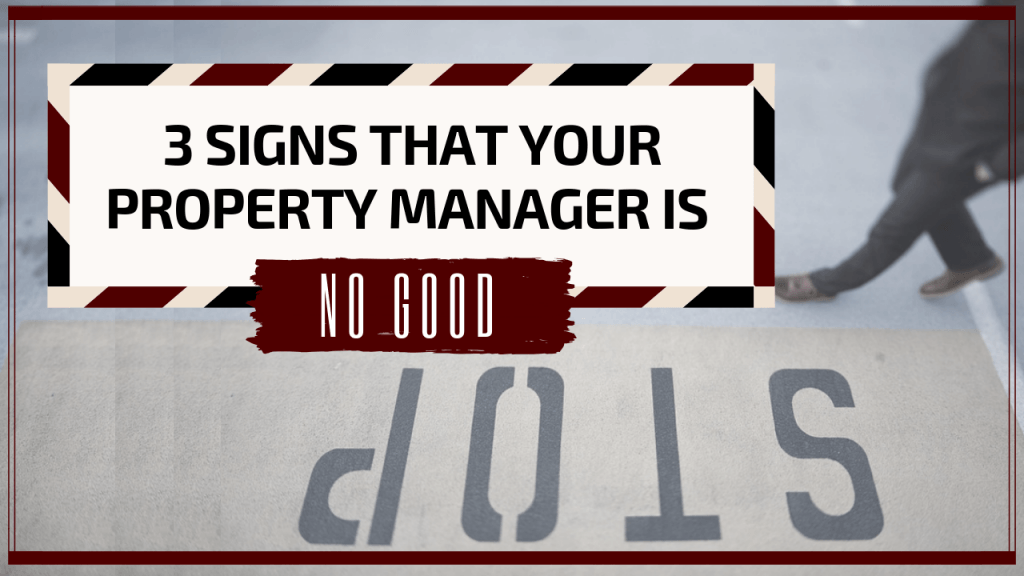BLOG

No one likes change, and when one of your most important and valuable assets is in the hands of a professional property management company, the idea of leaving that company to find a new property manager can be a bit unsettling. However, you deserve the best possible management and customer service. If you’re not getting what you need or what you’re paying for, it’ time to make a change. We’re talking about three major signs that your Tyler property manager is not doing what a good property manager should do. The three major issues that should make you consider switching management companies are financial issues, trust issues, and communication issues. Financial Issues and Tyler Property Management In the worst case scenario, someone is stealing from you and you have no idea where your money is going. That’s an obvious breach that needs to be dealt with immediately. However, there may also be financial issues that are more subtle. Here’s a story about a 25-unit complex that we recently took over from another management company: The owner of this property didn’t understand what was going on with his money, and he felt like he was being taken advantage of. As soon as we took a look at the financials for this complex, things began to make sense. We noticed that hundreds of thousands of dollars were shown as being spent on the property, but none of the work reflected was actually being done. Basically, the books were being cooked. There are, unfortunately, some blatantly dishonest management companies out there. Make sure you’re receiving statements every month, and be certain they make sense. Everything involving the income and expenses related to your property should be transparent and detailed. If you have any property management questions, ask those questions immediately, and don’t settle for vague answers. Outside of dishonesty, make sure your property manager is local and informed about accounting best practices. You’ll need someone who can help with year-end taxes and financial reports. Trust Issues and Tyler Property Management When you don’t understand the financials you’re seeing, it’s hard to trust the property management company that is providing them. Look for systems and procedures that check and balance each other. If your property managers are not checking on your property regularly, you don’t really know if your tenants are maintaining it or following the lease. Upkeep and maintenance are critical to preserving the asset and its value. If you cannot trust your property manager to take a look at the home and inspect it, you cannot really trust your property manager with any part of your property. Check your management agreement so you know exactly what you’re paying. Hidden fees and surprises when you get your monthly statement are no good. You should know exactly what services you’re receiving in exchange for your monthly management fee. Communication Issues and Tyler Property Management

Whether you’re buying your first investment property or you have an entire portfolio that is still growing, you need to surround yourself with professionals in order to be successful. A smart investor will have access to attorneys, accountants, brokers, and managers. If you’re wondering whether to talk to a real estate agent or a property manager in Tyler, there’s good news – you don’t have to choose. Talk to both of them. Each professional will bring extensive and local knowledge to your investment, and help you plan for both the long term and the short term. Realtors and property managers each bring something new to the table when you’re investing in the local real estate market. When you work with both of them, you get a wider view of the investment you’re about to make and what you can expect from it. Real Estate Agent Benefits A licensed Realtor can help you locate opportunities and negotiate deals. They understand the local sales market and they have experience understanding what properties are worth and how long they have been on the market. You’ll get a wealth of knowledge and talent when it comes to negotiating purchase price and purchase terms. Your real estate agent will also have an entire inventory of potential homes to show you. If you see one property and you like a few things but you’re not crazy about some of its other features, your agent can find something that better suits your needs. Count on your Realtor to help you find a home in your price range that helps you achieve your investment goals. Property Manager Benefits Just as sales agents understand the sales market, a property manager will understand the local rental market. This is an important part of buying an investment property. When you’re buying a home that you plan to live in, you are going to think about different things than you’ll think about when you’re buying a rental home. Your property manager can help you stay focused on the things that are important to your rental income, your ROI, and the future tenants that you hope to attract. With a trained eye, your property manager can help with inspections, transactions, and estimates about rental income and maintenance costs. Before you commit to purchasing a property, your manager can help you understand how long it may be on the market, what types of tenants will want to rent it, and how much you can expect to earn and spend.

The real estate market in Tyler, Texas is always changing, and at CrossPointe Management Group, we work hard to keep up with its trends and its changes. We know there are a lot of options for owners and investors when it comes to managing properties. Today, we want to share a few important reasons to consider us when you’re looking for someone to manage your multi-family property. We Love What We Do It’s hard not to notice our passion for the work we do and the properties we manage. We take a lot of pride in our company, and we want to deliver the best services and the most customer satisfaction that we can. Our standards are high, and we come to work every day determined to help you meet and exceed your investment goals. We have a lot of confidence in our operations. The systems and procedures we have in place have been improved upon over our many years of providing professional property management to the Tyler area. to the Tyler area. We know what we’re doing, and we put all of our knowledge, skills, and talents to work for you and your property. Exceptional Advertising and Marketing Services Our advertising resources are extensive. We make it easy for potential tenants to view your available listing and to get to know your property. We want to make the leasing process easy and efficient, and our goal is to save you on vacancy costs and to ensure we place the most qualified tenant we can find. Owners who work with us have access to all of our advertising and marketing tools, including software programs that streamline marketing. With our system, your home will immediately be posted to 150 websites. Prospective tenants can use our lockboxes through Rently to take a tour of the home at a time that’s convenient for them. You’ll see your listing on the Multiple Listing Service (MLS) as well as popular rental sites like Zillow and Trulia. We will rent your property quickly to the best tenants for the most rent. Licensed and Experienced Agents to Manage Every Part of Your Investment Transitioning from the purchase of a property to the management of a property is seamless when you work with us. Our team works side-by-side with our sister company, The RE/MAX Burks Team. This allows us to get your property on the market quickly. We work with licensed agents, and we can effectively manage your home through the entire investment lifecycle. We can even help you sell a unit. Sometimes, our tenants become interested in ownership, and they work with us to purchase either the unit they’ve been living in or another property that we manage.

Most people we talk to think that managing a multi-family property is generally the same as managing a single-family home. That’s not accurate, and if you’re an investor who has considered purchasing a multi-family rental property, make sure you understand what will be required. Multi-family Rental Properties in Tyler A multi-family investment differs from a single-family home in a number of ways. The physical structure is certainly different, and the tenants will interact with one another on a regular basis. With a single-family home, you rarely have to worry about tenants having conflicts or disputes with one another. There’s more responsibility involved in managing a multi-family property. Things need to be inspected and maintained more frequently than with single-family homes. There are common areas to think about as well. Usually, investors and owners don’t think about trash removal as something that needs to be maintained. However, it’s not a tenant’s responsibility. Other things that multi-family property owners are responsible for include: Landscaping Changing air filters for your tenants Pest control The lease needs to be written very differently for a multi-family property, and there’s a lot more interaction with both the property and your tenants. Hands-On Management is Required with Multi-Family Properties While you might be able to manage one single-family home from out of town, it’s nearly impossible with a multi-family property. You’ll need a property manager who is local and can be involved with the building. You might have a swimming pool that requires certification. There could be difficulties with assigned parking wherein a tenant’s car could be towed for being in the wrong spot. Most tenants in your multi-family property will expect a maintenance response 24 hours a day, even if it’s not an emergency. Some property types will require an on-site management presence. If there’s a clubhouse or a number of amenities like fitness centers or spas, an on-site leasing agent might be needed to show homes to prospective tenants. Your property manager may be able to work remotely, but you’ll want someone who is accessible and available when a response or action is needed immediately. Accounting and Reporting with Multi-Family Properties There are also many differences on the backend when it comes to managing multi-family properties. Owners will expect a lot more reporting when it comes to accounting statements and bookkeeping. You’ll want to be able to track your numbers, including occupancy rates, renewal rates, and the amount you’re earning in rent. We will provide monthly and annual reports that are detailed and transparent. If you want to raise rent or you’re considering a new investment, this type of data will be especially important to you. Investors who own multi-family properties need to be more open-minded about making upgrades and investing in maintenance. Your property manager should help with every part of that from planning to budgeting and hiring vendors.

One of the most important decisions you’ll make as a rental property owner is whether you want to manage your property on your own or hire a professional management company to do it. If you decide to do it alone, remember that there may be a lot of things you don’t know. Today, we’re covering some of the most essential topics in landlord education. Renters Rights and Tenant Screening: How to Place a Resident The leasing process will require a lot of your time. You’ll need to prepare the property for the market, spend some time researching comparable homes so you can correctly price the home, take good photos, develop a marketing and advertising strategy, and show the home to prospects after pre-screening them by phone or email. Then, you’ll need to process and screen tenant applications. Renters have a lot of rights, and you have to be careful during the leasing process. Violating fair housing laws, for example, will land you in a lot of legal trouble and cost you a lot of money. Your screening process must include, at a minimum, checking a credit report, conducting a nationwide eviction search, doing a criminal background check, verifying employment and income, and talking to current and former landlords. Understand Property Codes and Conduct Inspections The Texas Property Code includes a number of requirements for landlords. For example, you need to know what’s required in terms of deadbolts and peepholes on exterior doors. Keeping your property up to property codes is an ongoing project for landlords. You also need to conduct regular inspections. A move-in and move-out inspection is critical, and be sure to document and compare the condition of the home at each point. Do at least one interior inspection during the course of the tenancy, and drive by the property frequently to look for potential lease violations. Managing the Eviction Process When you do a thorough job screening tenants, maintain consistent policies, and enforce the lease, you’ll have little reason to evict anybody. However, bad things happen to even the perfect tenants, and if you have a resident who has stopped paying rent, you may need to evict. It’s important to follow the proper legal steps and not violate any renters rights. Unless you have experience with the courts and real estate law, we don’t recommend you begin an eviction on your own. Be sure to check out our blog on the eviction process, so you know what to expect. Maximizing your Return on Investment (ROI)





